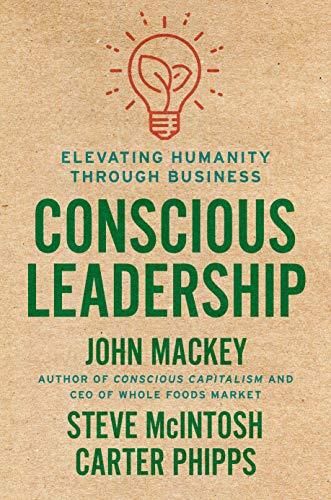Whole Foods co-founder and CEO John Mackey and forward thinkers Steven McIntosh and Carter Phipps detail how to become a more conscious, egalitarian and successful leader.

Become Conscious
John Mackey, Whole Foods co-founder and CEO and the co-author of Conscious Capitalism, collaborated here with the founders of the Institute for Cultural Evolution – authors Steve McIntosh and Carter Phipps. Being a conscious leader, they explain, means that instead of making sure you win, you should see that everyone else – stakeholders, employees, business partners – wins. They detail the way you can exemplify the company and teams you want to create.
Mackey and his co-authors explain how to incorporate honesty, integrity and love in your leadership. They offer admirable methods for aligning personal evolution with profit and make clear that personal growth and successful business growth can nurture one another. The fact that most of their ideas exist in a new mainstream, and that few of them seem original, does not, weirdly, detract from the power of their message. This may stem from the authors’ undeniable sincerity and belief in their mission.
Reevaluation
When the Whole Foods board of directors almost voted John Mackey out of the company in 2001, he knew he had to lead with greater introspection, honesty and accountability – to become a conscious leader.
If I wanted to continue to lead Whole Foods…I needed to grow and evolve as a conscious leader.John Mackey
Becoming a conscious leader differs for each person, but it always incorporates elements of living up to your purpose, finding solutions that allow everyone to win, and cultivating a culture of innovation and growth.
Purpose
Few people instinctively know their life’s purpose. Mackey, McIntosh and Phipps, like many authors before them, assert that discovering your purpose takes conscious work. Usually, the core of a company’s purpose emerges from its values. Whole Foods, for example, identifies its value as “health and vitality” for people and the planet.
The first…job of every conscious leader, as Lincoln knew, is to connect people to purpose.John Mackey, Steve McIntosh, Carter Phipps
Mackey, McIntosh and Phipps urge you to regard your business as a community of your staff, customers, shareholders and local audience. As a leader, your goal is to create value for everyone in that community. This requires rejecting a binary win-lose decision-making framework, and shifting your approach to embrace win-win-win solutions.
Love & Truth
The book cites author Steve Farber who said love is the basis for win-win-win outcomes. When you infuse love into your leadership and business, your community benefits from authenticity, trust and loyalty. Mackey and his co-authors evoke servant leadership, which calls for leaders to regard themselves as servants of the organization’s stakeholders.
Authentic community is practically the holy grail of business brands in today’s world. John Mackey, Steve McIntosh, Carter Phipps
Love, the authors explain for those who might request a definition, encompasses generosity, gratitude, appreciation, compassion, forgiveness and caring about your stakeholders. Love supports people and inspires them.
Mackey, McIntosh and Phipps write that integrity derives from truth. They offer a telling example: In 2006, when Ford was losing billions, executives presented Ford’s new CEO with positive financial news. The CEO stopped the meeting; he didn’t want spin; he wanted truth.
Win-Win-Win
In 2017, the JANA hedge fund bought 8.8% of Whole Foods’ stock and sought to earn short-term profits by selling the company – in spite of Whole Foods’ record-breaking 30-year average of 8% increases annually in same-store sales.
Jeff Bezos of Amazon promised to honor Mackey’s ideals, and together they sought a merger that offered win-win-win solutions.
A conscious leader must be able to convey…a unique combination of faith and foresight. John Mackey, Steve McIntosh, Carter Phipps
Amazon raised the minimum wage of Whole Foods store workers to $15 per hour. It paid $42 per share, representing a 41% increase over Whole Food’s pre-buyout share price. And it enabled Whole Foods to continue its 10% profit give-back to local communities.
Innovation
Conscious leaders, Mackey, McIntosh and Phipps say, don’t need to embody innovation; they should cultivate creativity while understanding that innovation comes from the edges, not the center of an organization.
Innovation…at its heart is about creating life-enhancing value and sharing it with others.John Mackey, Steve McIntosh, Carter Phipps
However, if you pledge to support creativity and innovation, then you must reward creative, innovative work. Innovating involves risk, and you will sometimes fail. When you do, the authors recommend – again, as does every other contemporary author discussing failure – that you acknowledge your mistakes, learn the lesson and seek new opportunities.
Winning Teams
Mackey, McIntosh and Phipps believe that short-term thinking, derived from the primacy of financial metrics that define a company’s success, limits teams’ and CEOs’ decisions. Having a longer-term view generates hope because it reminds you that you can modify the future.
The moment you…apply last month’s insight to today’s issues is the moment your decision-making suffers. John Mackey, Steve McIntosh, Carter Phipps
Implementing winning teams may mean rethinking your hiring process to favor those capable of creating a more sustainable culture. Whole Foods fills leadership positions primarily with internal candidates; only 25% of jobs go to external applicants. As CEO, Mackey sought this balance because internal candidates tend to be more successful while external candidates provide new perspectives.
To create a conscious culture, be authentic in what you say and do, understand your own positive and negative traits, and create a workplace in which you and your staff embody love, trustworthiness and care.
Embrace continual learning to help you delve into issues and find solutions more quickly.Be curious about gaining knowledge and about understanding yourself, even if what you learn feels uncomfortable. To be a conscious leader, learn to understand your idiosyncrasies and emotions as pathways to personal growth.
Lively
Mackey, McIntosh and Phipps use a lively, direct, enthusiastic tone to present ideas that, for the most part, have become – in the past few years – clichés of what you might call New Age management: Love sells, forgive failure, learn from errors, reject hierarchy and build a supportive culture. Of course, none of these are bad ideas; they all are worthwhile alternatives to the command-and-control hierarchy, which seems to be fading but, in fact, remains the norm. For all their vesting in kindly management tropes, the authors still provide both practical and spiritual advice for entrepreneurs and leaders seeking a more evolved corporate culture.
John Mackey also co-authored Conscious Capitalism, The Whole Foods Diet, The Whole Foods Cookbook and Be the Solution. Steven McIntosh also wrote Developmental Politics: How America Can Grow into a Better Version of Itself, and Carter Phipps wrote Evolutionaries: Unlocking the Spiritual and Cultural Potential of Science’s Greatest Idea.











